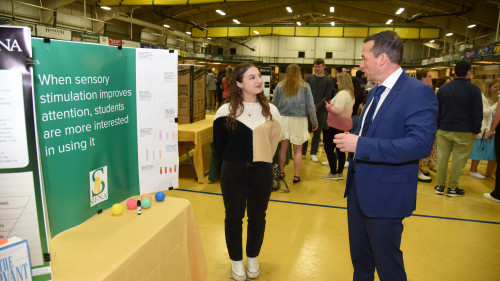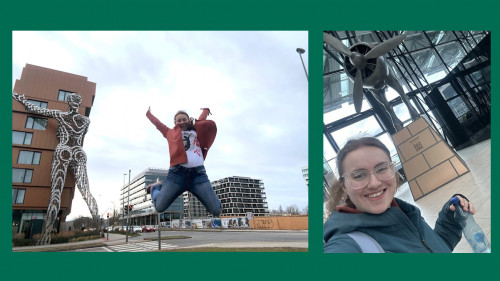
Click here to see more photos.
There is a world of difference between middle schoolers and college students – those few short years hold a wealth of experience and growth. But these two age groups are coming together to explore issues of leaving home and writing as therapy in the young adult memoir Ghosts of War.
Students in Siena’s First Year Seminar, directed by Meg Woolbright, Ph.D., professor of English, are working together with sixth through eighth graders from St. Gregory’s School in Loudonville, not as mentors, but as fellow scholars on the road to learning more about engaging with a text and writing clearly and persuasively.
Ghosts of War was written in 2009 by Ryan Smithson, to help him heal from his experiences in Iraq while serving with the Army Reserves. Smithson visited with students from both schools in October to speak about his experiences and how he learned to deal with them through writing.
Fr. Ken Paulli ‘82, O.F.M. associate professor of education, explained that FYS asks professors to develop topics within certain themes, employing various texts, and Fr. Ken created “leaving home” around Smithson’s memoir, which is being read by half of the freshmen.
“The theme was inspired by St. Francis, who couldn’t truly accept God’s plan for him until he left the boundaries of the town of Assisi,” he said.
Fr. Ken, who is on the board of trustees at the all-boys St. Gregory’s, came up with an idea that would provide the opportunity for students of different age ranges to study the book together and write about it. While Siena’s freshmen are studying the entire book, the middle schoolers are focusing one chapter about writing as therapy.
“First Year Seminar at Siena is about really learning to read and write in an academic sense,” he explained. “It’s about learning to work with a text. The middle schoolers are also making great strides in these areas, and it made sense to brings these two age groups together. They really dig into the text.”
Smithson, an East Greenbush native whose book is taught in classes all across the United States, worked with St. Gregory’s boys to prepare them for a lecture he gave at Siena on Oct. 12. The Maloney Great Room was packed for his talk. The young man clad in a sharp navy blazer looked a far cry from the soldier in dusty fatigues holding a rifle that he was more than a decade ago.
Deployed to the Middle East at the age of 19 as an engineer, Smithson was deeply shaken by the things he saw during his time overseas. When he returned home, he took courses at Hudson Valley Community College, where his professor noticed his writing talent – and his cries for help in the compositions he wrote for class.
Smithson often speaks to groups of students, but at his Siena lecture he had to walk a fine line to hold the interest of students in such a wide age range.
“When you speak at a college, you have to realize that the students are almost fully adults,” he said. “I don’t do any Louis CK-type stuff but you can go places when you talk to college students that you can’t with middle and high schoolers. Their worldview is different. They’re free and they don’t have as many rules. With middle schoolers the biggest challenge is not getting too far over their heads. I have to keep making sure I’m hitting it with them.”
Justine Guinaw ’20 of Kings Park, NY is thoroughly impressed with her First Year Seminar experience and Smithson’s book.
“I absolutely adore this seminar,” she said. “We get to state and defend our thoughts and opinions in way we have not been challenged to do before.”
Guinaw, an ROTC cadet, said she has read before about war and the military, but usually about soldiers in World War II or Vietnam.
“This was about something so recent,” she said about an event of historic importance that happened in the students’ lifetimes. “And Ryan was just a year older than we are now when he was sent to Iraq. It’s not often that we get to study about something so recent, and about someone close to our age.”
Smithson agrees that teaching about recent events is just as important as delving into what happened decades or centuries ago.
“High schoolers today were born after 9/11,” he said. “It’s history to them. They have always lived in this world. They don’t know a world before 9/11 and how life-changing that moment was.”
It was the 9/11 terrorist attacks that originally prompted Smithson to join the military. Propelled by the need to do something for his country, he joined the Army Reserves when he was just out of high school.
“Students that I speak to can relate to not knowing where to put your foot next,” he shared. “Things in life come out of nowhere at you when you are coming of age.”







